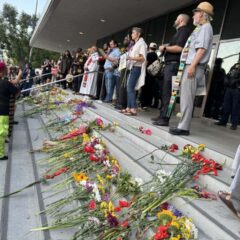Nalika Gajaweera co-edited a special issue of the Journal of Global Buddhism on Buddhism and Resilience with Darcie DeAngelo. Below is an excerpt of their introduction along with a list of articles in the special issue. All articles are open access and can be downloaded as a PDF from the journal’s website.
Introduction: Buddhism and Resilience
In recent years, the term resilience seems to be ubiquitous. People deploy the term in academic and political circles from fields as varied as ecology, mental health, human development, and humanitarianism. The term’s broad conceptual spectrum verges on producing a floating signifier, but common patterns of its use also emerge. Overall, resilience as a concept indicates how well individuals, communities, and even ecosystems anticipate, adapt and recover—in other words, how much subjects “bounce back” from existential stress, trauma and/or violence.
Scholars and policymakers alike focus on particulars about the range of resilience. Where does the capacity for resilience stem from? Why do some people bounce back from adversity better than others? What rituals, practices, and techniques have human societies developed and drawn upon to respond to social suffering and do these affect resilience?
Buddhism has become a growing area of interest in relation to the psychological studies of resilience. Health practitioners, policy makers, and others implement interventions to promote resilience now tagged under the heading “mindfulness,” another psychological remaking of Buddhism as a powerful modality for cultivating human resilience and the capacity to recover from loss and trauma. Although rooted in canonical Buddhist texts and traditions, mindfulness can now be seen in a wide range of non-religious contexts from university campuses, clinical settings and even state government. This adoption of a technique grounded in Buddhist religious practice connects Buddhist practice to resilience but also turns away from its original Buddhist soteriological goal of nirvana. Associating Buddhist mindfulness with resilience has been widely regarded as a particularly western modern reinterpretation of Buddhism (Samuel 2015; Sharf 2015; Wilson 2014; Gleig 2019).
Yet, across South and Southeast Asia, Buddhist practices, ideas, and institutions, often beyond mindfulness and meditation, have long been viewed as fundamental for dealing with existential distress, for responding to ethical questions of how ought one to live, cultivating resilience in locally situated ways (Aulino 2019; Desjarlais 2016).
This special issue brings together the work of anthropologists who explore local modes of resilience and how they are connected to Buddhist practice on the ground. The authors attend to the shifting meanings of Buddhist responses to suffering across time and space.
As the authors focus on local practice and concepts, they bring an anthropological sensitivity to how Buddhist ideologies, cosmologies, and discourses are grounded in concrete aspects of their social worlds, including class, race, gender relations and power dynamics, and the political economy of life in local contexts. Each paper pays careful attention to how individuals are circumscribed by their local context, appropriating and deploying practices selectively and strategically to respond to adversity, stress, and existential suffering. In this collection, we seek to situate approaches to Buddhism and resilience in order to avoid a narrow functionalist understanding of the relationship between the two.
Each paper depicts how different local actors deploy, contest and revise received Buddhist tradition in the context of stress. In the individual field sites, Buddhist interlocutors often choose to give prominence to different aspects of the inherently pluralistic Buddhist tradition, sometimes strategically selecting ideas for interpretation for their own ends. This is a process that offers manifold opportunities for creative revision and amendment; one that as anthropologist Nancy Eberhardt has suggested elsewhere (2006), shapes anthropological scholars’ reticence to privilege doctrinal or canonical Buddhism over customary practice and local interpretation.
Download to read the full introduction.
Table of Contents – Vol 22, No 1 (2021)
Special Focus: Buddhism and Resilience
Introduction: Buddhism and Resilience
NALIKA GAJAWEERA, DARCIE DEANGELO
Mindfulness and Resilience in Britain: A Genealogy of the “Present Moment”
JOANNA COOK
Mindfulness or Sati? An Anthropological Comparison of an Increasingly Global Concept
JULIA L. CASSANITI
Sitting in the Fire Together: People of Color Cultivating Radical Resilience in North American Insight Meditation
NALIKA GAJAWEERA
Resilience and the Ethics of “Big Mind” Thinking in the Tibetan Diaspora
SARA M. LEWIS
Buddhism and Resilience in Post-tsunami Thailand
MONICA LINDBERG FALK
Resilient Relations: Rethinking Truth, Reconciliation, and Justice in Cambodia
DARCIE DEANGELO
Nalika Gajaweera was a senior research analyst with the USC Center for Religion and Civic Culture through 2023.





